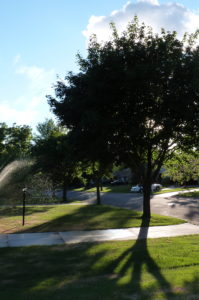What hampers new beginnings of all kinds within the human experience are ideas that things cannot be different than they once were. T3:15.2
My early morning time in my cabin, and early evening walk through the neighborhood, are very different, and yet much the same. I look out the window of the cabin at morning plays of light. It’s my writing time, full of reverie. In the evening, I take my camera and see with childlike eyes. I walk past giant pines and remember how I’d wonder, as a child, what lurked beneath them—and how I would often go investigate. I pass the rise and fall of a sprinkler and remember what it felt like to answer the question of what it would feel like to walk beneath it. I recall summer rains when my mom would let my sister and I go out in the alley, with umbrellas over our heads and bathing suits on our young torsos. We’d go down the hill to the end of the alley where the rain collected, and splash, barefoot, in the growing puddles.
I sometimes pass other walkers on my suburban street, and can see, in a glance of the body language of their walk, whether it is a troubled walk, or a walk taken for exercise. Me? I meander, camera slung over my shoulder.
Everything seems a play between the hidden and the obvious, the obscure and its revelation.
Me too.
 I’ve noticed revelation coming in ordinary ways lately. These revelations are about me. Suddenly, I know something about myself that I didn’t know before. What was hidden has come to consciousness. These revelations, while ordinary, are not insignificant. What comes to consciousness changes me. . . instantly. My view of myself is different, as different as morning and evening, as one day’s walk through the neighborhood from the next.
I’ve noticed revelation coming in ordinary ways lately. These revelations are about me. Suddenly, I know something about myself that I didn’t know before. What was hidden has come to consciousness. These revelations, while ordinary, are not insignificant. What comes to consciousness changes me. . . instantly. My view of myself is different, as different as morning and evening, as one day’s walk through the neighborhood from the next.
I invite you to notice ordinary revelations about yourself.
You must now birth the idea that human beings do indeed change. While you have known instinctively that there is a core, a center to each that is unchangeable, you must now give up the idea that this core or center has been represented by the past. You must forget the idea that the future cannot be different than the past. T3:15.7


I often struggle with the seeming “gap” between 1) us as individuals struggling to uncover “the better angels of our nature” and thus helping to heal the world, and 2) the mass movements that will be needed to correct the cruel aspects of our political-economic system in the USA – a system that is crushing the life of of millions in our country – poverty, joblessness, huge numbers of people (more per capita, I think, than any other industrial nation) confined and seeing their lives being fruitless and wasteful, and the ever growing (since around 1980) gap between the 1% and the rest of us in income, opportunities, etc. On top of all there, there are many in high places who deny global warming and this leads to our not serving as “good stewards” of the nature order which sustains our bodily life. Perhaps the underlying flaw in our nation’s cultural values currently is the extreme individualism which is fueling all of the above – a betrayal of the teachings of the world’s religions, in my opinion.